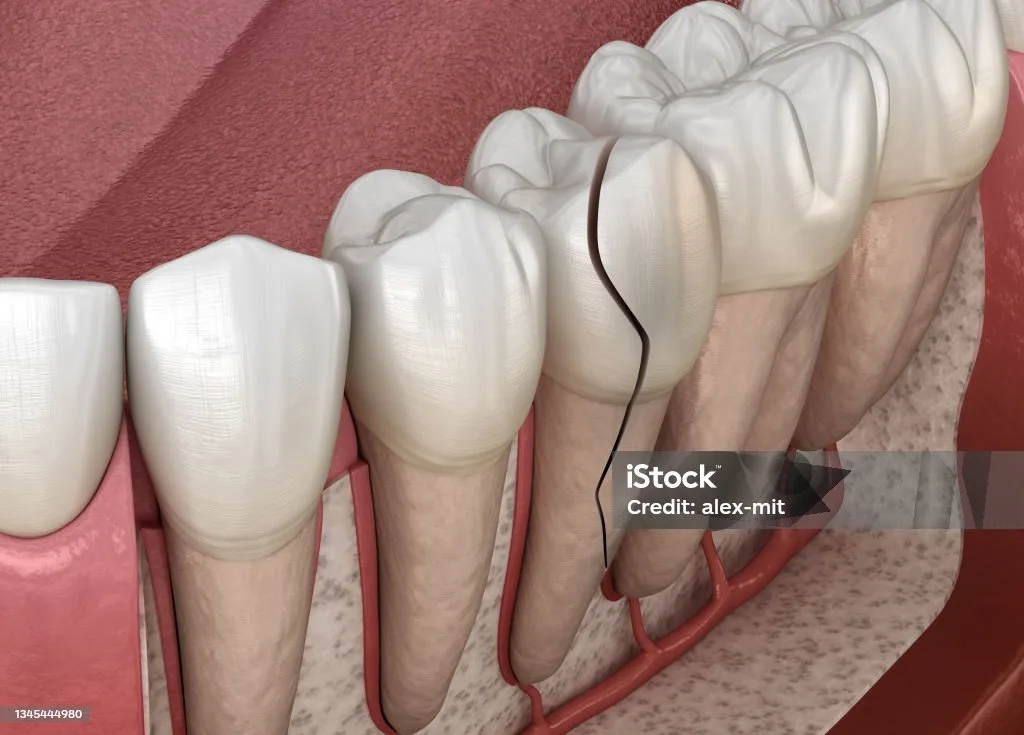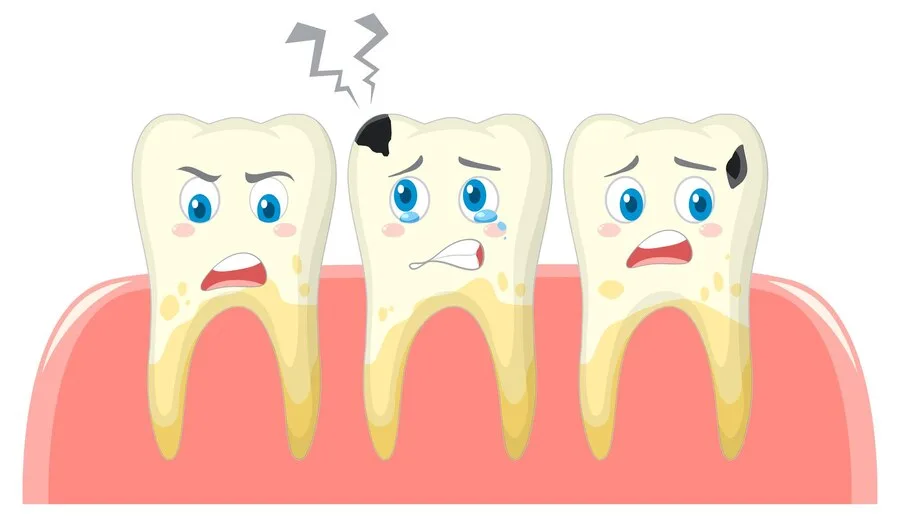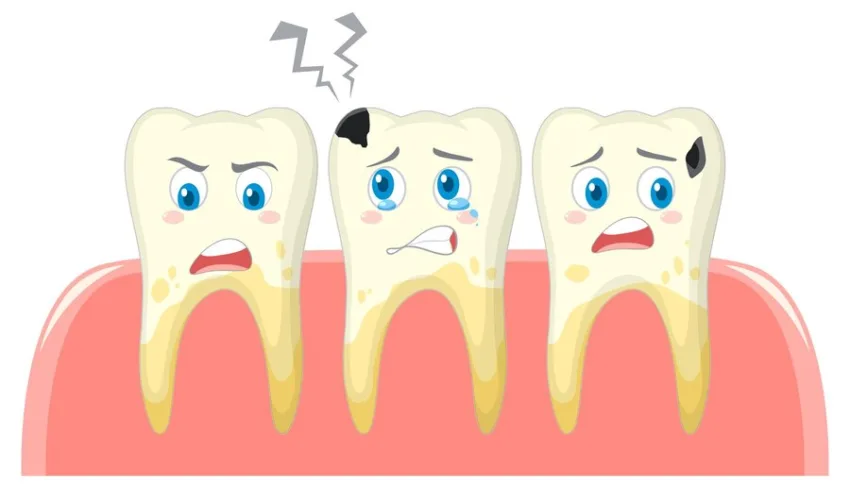How to Fix a Cracked Tooth Naturally:

A Comprehensive Guide
Introduction
At Talk Express Hub, we understand the discomfort and concern that comes with a cracked tooth. While seeking professional dental care is essential, there are natural remedies and preventive measures you can take to alleviate symptoms and promote healing.
Understanding Cracked Teeth
A cracked tooth can result from various factors, including trauma, teeth grinding, or biting on hard objects. Regardless of the cause, addressing a cracked tooth promptly is crucial to prevent further damage and potential infection.
Assessing the Severity

Before attempting any natural remedies, it’s essential to assess the severity of the crack. Minor cracks may only cause discomfort when biting down, while more significant fractures can expose the inner layers of the tooth, leading to sensitivity and pain.
Natural Remedies for Cracked Teeth
While natural remedies cannot replace professional dental treatment, they can provide temporary relief and promote healing. Here are a few regular solutions for consider:
In our pursuit of optimal health and well-being, natural remedies often offer safe and effective alternatives to conventional treatments. When it comes to dental issues such as a cracked tooth, exploring natural solutions can provide relief and promote healing without the need for invasive procedures.

1. Saltwater Rinse
A saltwater rinse can help cleanse the mouth and reduce inflammation around the cracked tooth. Essentially break down a teaspoon of salt in warm water and gargle it around your mouth for around 30 seconds prior to letting it out.
2. Clove Oil
Clove oil has natural analgesic and antibacterial properties, making it effective in relieving tooth pain and reducing inflammation. Apply a small amount of clove oil to the affected tooth using a cotton swab or your finger.
3. Turmeric Paste
Turmeric contains curcumin, a compound known for its anti-inflammatory and antimicrobial properties. Mix turmeric powder with water to form a paste and apply it directly to the cracked tooth. Leave it on for a couple of moments prior to washing completely.
4. Oil Pulling

Oil pulling includes gargling coconut oil or sesame oil around in your mouth for a few minutes prior to letting it out. This practice can help remove bacteria and reduce inflammation, promoting overall oral health.
5. Green Tea
Green tea is rich in antioxidants and has anti-inflammatory properties, making it beneficial for oral health. Drink a cup of unsweetened green tea daily to help reduce inflammation and support healing.
Preventive Measures

In addition to natural remedies, adopting preventive measures can help protect your teeth from further damage. Avoid biting on hard objects, wear a mouth guard if you grind your teeth at night, and maintain good oral hygiene habits.
Understanding Cracked Teeth
Cracked teeth can vary in severity, ranging from minor surface cracks to deep fractures that extend into the root. Common causes include trauma, teeth grinding, and biting on hard objects. Symptoms may include pain while chewing, sensitivity to hot or cold temperatures, and swelling of the gums.
Assessing the Severity
Assessing the severity of a cracked tooth is crucial for determining the appropriate course of action. A dentist can perform various tests, such as visual inspection, X-rays, and bite tests, to evaluate the extent of the crack and identify any underlying issues.
Natural Remedies for Pain Relief
When dealing with the discomfort of a cracked tooth, natural remedies can provide temporary relief. A saltwater rinse can help reduce inflammation and disinfect the mouth, while clove oil acts as a natural analgesic, numbing the affected area. Turmeric paste, with its anti-inflammatory properties, can also help alleviate pain and swelling.
Natural Remedies for Healing
To promote healing and prevent infection, consider incorporating oil pulling into your oral hygiene routine. Swishing coconut oil or sesame oil in your mouth for several minutes each day can help remove bacteria and reduce inflammation. Additionally, drinking green tea and applying aloe vera gel to the affected tooth can aid in the healing process.
Preventive Measures
Preventing cracked teeth starts with adopting healthy habits and lifestyle choices. Avoid chewing on hard objects such as ice cubes or popcorn kernels, and wear a mouth guard if you grind your teeth at night. Keep up with great oral cleanliness by brushing and flossing consistently and visiting your dental specialist for normal check-ups.
Diet and Nutrition
Your diet plays a significant role in your dental health. Incorporate foods rich in calcium, such as dairy products and leafy greens, to strengthen your teeth and bones. Stay away from sweet and acidic food sources that can add to tooth rot and disintegration.
Lifestyle Habits
Certain lifestyle habits can increase the risk of cracked teeth. Avoid using your teeth as tools to open packages or bottles, and refrain from biting your nails or chewing on pens and pencils. In the event that you take part in physical games, wear a mouth guard to shield your teeth from injury.
Professional Dental Care

While natural remedies can provide temporary relief, it’s essential to seek professional dental care for a comprehensive evaluation and treatment plan. Your dentist can assess the severity of the crack and recommend appropriate interventions, such as bonding, crowns, or root canal therapy.
Conclusion
Integrating normal cures into your dental consideration routine can supplement proficient treatment and advance generally speaking oral wellbeing.. By understanding the causes of cracked teeth, adopting preventive measures, and seeking timely dental care, you can maintain a healthy and functional smile for years to come.
FAQs
Are cracked teeth common?
Cracked teeth are more common than you might think, especially among adults. Factors such as trauma, teeth grinding, and poor oral hygiene can increase the risk of developing cracked teeth.
Can cracked teeth heal on their own?
Minor cracks may be able to heal on their own with proper care and natural remedies. However, more severe fractures may require professional dental treatment to prevent further damage.
Is it safe to use natural remedies for dental issues?
Natural remedies such as saltwater rinses, clove oil, and turmeric paste are generally safe when used as directed. However, it’s essential to consult with a dentist before trying any natural remedies, especially if you have underlying dental conditions.
How can I prevent cracked teeth?
To prevent cracked teeth, avoid biting on hard objects, wear a mouth guard if you grind your teeth, and maintain good oral hygiene habits. Regular dental check-ups can also help identify and address any issues early on.
When should I see a dentist for a cracked tooth?
If you experience persistent pain, sensitivity, or swelling in your tooth, it’s essential to see a dentist promptly. Deferring treatment can prompt further harm and inconveniences.
Are there any foods that can help prevent cracked teeth?
Foods rich in calcium and vitamin D, such as dairy products, leafy greens, and fortified cereals, can help strengthen your teeth and bones, reducing the risk of cracked teeth.
Cracked Tooth Reasons
A cracked tooth can be a painful and concerning dental issue that affects many individuals. Understanding the causes behind a cracked tooth is crucial for preventing and addressing this problem effectively.
Anatomy of a Tooth
Before delving into the causes of a cracked tooth, it’s essential to understand the basic anatomy of a tooth. A tooth consists of several layers: the enamel, dentin, pulp, and roots. The enamel is the hard outer layer that protects the inner layers of the tooth.
Types of Tooth Cracks
There are various types of tooth cracks, each with its own characteristics and severity. These include:
- Frenzy lines: Shallow breaks that influence just the lacquer.
- Fractured cusp: A crack that occurs in the chewing surface of the tooth.
- Vertical root fractures: Cracks that extend from the root upwards.
- Split tooth: A severe type of crack that splits the tooth into two separate parts.
- Horizontal root fractures: Cracks that run horizontally across the root of the tooth.
Common Causes

Several factors can contribute to the development of a cracked tooth:
- Trauma: Accidents or injuries to the mouth can cause tooth fractures.
- Teeth grinding: Habitual teeth grinding or clenching can weaken the enamel and lead to cracks.
- Chewing hard objects: Biting down on hard objects such as ice, pens, or nuts can cause teeth to crack.
- Temperature changes: Rapid changes in temperature, such as consuming hot foods followed by cold drinks, can stress the tooth enamel.
- Tooth rot: Untreated holes can debilitate the design of the tooth, making it more helpless to breaks.
Risk Factors
Several factors increase the risk of developing a cracked tooth:
- Age: Older adults are more prone to tooth cracks due to wear and tear over time.
- Oral hygiene: Poor oral hygiene habits can weaken the enamel and make teeth more vulnerable to cracks.
- Diet: Consuming a diet high in sugary or acidic foods can increase the risk of tooth decay and subsequent cracks.
- Dental treatments: Certain dental procedures, such as fillings or root canals, can weaken the structure of the tooth and make it more prone to cracking.
Symptoms and Diagnosis
The side effects of a broke tooth can differ contingent upon the seriousness of the break. Normal signs include:
- Pain: Persistent pain when chewing or biting down.
- Visible cracks: In some cases, cracks may be visible on the surface of the tooth.
- Dental examination: A dentist can diagnose a cracked tooth through a visual examination and may use dental X-rays to assess the extent of the crack.
- Awareness: Expanded aversion to hot or cold temperatures.
Complications
Ignoring a cracked tooth can lead to various complications, including:
- Infection: Bacteria can enter the crack and cause infection, leading to pain and swelling.
- Tooth loss: Severe cracks may necessitate tooth extraction if they cannot be repaired.
- Gum disease: Cracked teeth can create pockets where bacteria can accumulate, increasing the risk of gum disease.
Prevention Tips

Preventing a cracked tooth starts with adopting good oral hygiene habits and making smart lifestyle choices:
- Wear a mouth guard: If you grind your teeth at night or participate in contact sports, wearing a mouth guard can protect your teeth from damage.
- Avoid chewing hard objects: Be mindful of what you bite down on and avoid chewing on hard objects such as ice or pens.
- Practice good oral hygiene: Brush and floss regularly to remove plaque and bacteria from your teeth and gums.
- Regular dental check-ups: Visit your dentist for routine check-ups and cleanings to catch any issues early on.
Treatment Options
The treatment for a broke tooth relies upon the seriousness and area of the break. Treatment options may include:
- Bonding: A tooth-colored resin is applied to the surface of the cracked tooth to repair minor cracks.
- Crown: A dental crown is placed over the cracked tooth to restore its shape, size, and strength.
- Root canal therapy: If the crack extends into the pulp of the tooth
Conclusion


While natural remedies can provide temporary relief for a cracked tooth, it’s essential to seek professional dental care for a comprehensive evaluation and treatment plan. By combining natural remedies with preventive measures, you can support healing and maintain optimal oral health.

1 thought on “How to Fix a Cracked Tooth Naturally | 5 Comprehensive Guide”